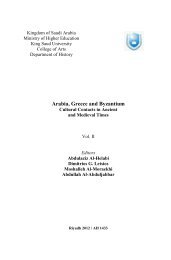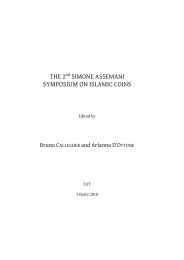ulum-al-quran
ulum-al-quran
ulum-al-quran
Create successful ePaper yourself
Turn your PDF publications into a flip-book with our unique Google optimized e-Paper software.
'... this is indeed a Qur'an most honourable, in a book (kitab) well guarded, which none sh<strong>al</strong>l<br />
touch but those who are clean: a revelation from the Lord of the worlds' (56: 77-80).<br />
The same fact, i.e. that the Qur'an did exist as a written document in the lifetime of the Prophet is proved by the<br />
following ahadith:<br />
From Ibn 'Umar: ... 'The messenger of Allah (may peace be upon him) said: "Do not take the Qur'an on a<br />
journey with you, for I am afraid lest it should f<strong>al</strong>l into the hands of the enemy". [Muslim, III, No. 4609,<br />
<strong>al</strong>so 4607, 4608; Bukhari, IV, No. 233.]<br />
The correctness of the assumption that the reference is to a written document is supported by one of the transmitters:<br />
Ayyub (i. e. one of the narrators in the chain of transmission of this report) said: The enemy may seize it and may quarrel<br />
with you over it. [Muslim, III, No. 4609.]<br />
Furthermore, the chapter-heading used by Bukhan for the section, (which usu<strong>al</strong>ly contains addition<strong>al</strong> information,)<br />
explains:<br />
'Ibn 'Umar said: No doubt the Prophet and his Companions travelled in the land of the enemy and they<br />
knew the Qur'an then.' [i.e. they knew that the Quran was carried - as a scripture - by the Muslims.<br />
Bukhan, IV, p. 146, Ch. 129.]<br />
Collection of Revelation during the Prophet's Lifetime<br />
During his last pilgrimage, at the sermon which he gave to the large gathering of Muslims, the Prophet said: 'I have left<br />
with you something which if you will hold fast to it you will never f<strong>al</strong>l into error- a plain indication, the book of God and<br />
the practice of his prophet. [Ibn Hisham, p. 651.]<br />
This advice from the Prophet to the Muslims implies that the revelation was available as kitab (writing) before his death,<br />
for otherwise he would have referred to it in some other term.<br />
From other reports <strong>al</strong>so, we can conclude that the Prophet himself took care of the actu<strong>al</strong> arrangement of the revelation,<br />
when it was written down.<br />
Zaid is reported to have said:<br />
'We used to compile the Qur'an from sm<strong>al</strong>l scraps in the presence of the Apostle.' [Itqan, I, p. 99; S<strong>al</strong>ih,<br />
p.69.]<br />
'Uthman said, that in later days, the Prophet 'used to, when something was reve<strong>al</strong>ed to him, c<strong>al</strong>l someone from among<br />
those who used to write for him and said: Place these ayat in the sura, in which this and this is mentioned, and when<br />
(only) one aya was reve<strong>al</strong>ed to him, he said: Place this aya in the sura in which this and this is mentioned'. [Jeffery, A.:<br />
Materi<strong>al</strong>s for the history of the text of the qura'n, (incl. Kitab <strong>al</strong>-masahif by Ibn Abi Dawud (abbr. as Ibn Abi Dawud,<br />
masahif) Leiden, 1937, p. 31.]<br />
This indicates that not only was the revelation written down during the lifetime of the Prophet, but that he himself gave<br />
instructions for the arrangement of the materi<strong>al</strong>. According to some other reports, it is <strong>al</strong>so clear, that this proper<br />
arrangement and order of the ayat was well known to the Companions of the Prophet, and they were not prepared to<br />
tamper with it.<br />
'Narrated Ibn Az-Zubair: I said to 'Uthman "This verse which is in Sura <strong>al</strong>-Baqara: 'those of you who die<br />
and leave wives behind ... without turning them out' has been abrogated by another verse. Why then do<br />
you write it in the Qur'an" 'Uthman said: Leave it (where it is) O son of my brother, for I will not shift<br />
anything of it (i . e. the Qur'an) from its origin<strong>al</strong> position.' [Bukhari, VI. No. 60.]<br />
Similarly quite a number of reports mention the various Suras by their names or beginnings. Two examples may suffice to<br />
make this point:<br />
Narrated Abu Huraira: The Prophet used to recite the following in the Fajr prayer of Friday: Alif Lam Mim<br />
Tanzil (Sajda) (32) and H<strong>al</strong>-ata '<strong>al</strong>a-l-Insani (<strong>al</strong>-dahr) (76). [Bukhari, II, No. 16.]<br />
Abu Huraira said: God's messenger recited in both rak'as of the dawn prayer: "Say O unbelievers (99)<br />
and Say, He is God, one God (112).' [Robson, J. (transl.): Mishkat <strong>al</strong> Masabih, Lahore, 1963, I, pp. 172-3<br />
- Tabrizi: Mishkat<strong>al</strong>-masabih, Beirut, 1961, I, No. 842.]





